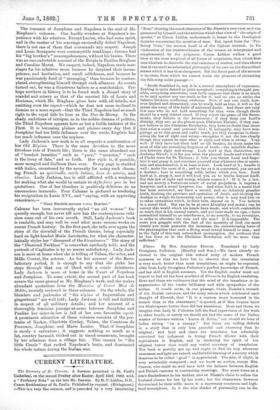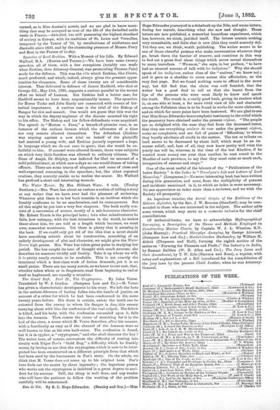Eliane. By Mrs. Augustus Craven. Translated by Lady Georgiana Fullerton.
(Bentley and Son.)—We have already re- viewed in the original this refined story of modern French manners, so that we have but to observe that the translation is very much better than most translations, as might be expected, alike from Lady Georgiana Fullerton's perfect knowledge of French, and her skill in English romance. Yet the English reader must not expect to find all the finer qualities of Eliane in its English rendering. Here and there are evidences that the mind of the translator is in- appreciative of the tender brilliancy and wide sympathies of the author. It would seem, in one passage, where Hamlet's remark of the Danish carouses, and the noisy salvos which celebrated each draught of Rhenish, that " It is a custom more honoured in the breach than in the observance," is quoted, as if Mrs. Craven knew her Shakespeare better than did her translator. Here and there, we imagine that Lady G. Fullerton left the final supervision of her work to other bands, or surely we should not find the name of the Italian master of faience written " Lucca di Robin," nor should we hear of ladies sitting " on a canopy." But these are trifling defects in a story that is only less graceful and charming than its original ; and here and there the translator has admirably exercised her judgment in fitting French idioms with their equivalents in English, and in rendering the spirit of her original better than could any verbal accuracy of translation. The book is prettily got up, and ought to find its way wherever sweetness and light are valued, and faithful drawing of a society which deserves to be called " good " is appreciated. The plot, if slight, is very artistically composed ; and we know no author, except Mrs. Craven, who could so well have held the balance between English and French customs in contracting marriage. The story turns on a eon's disobedience to his mother, and on Eliane's claim to refuse the husband chosen for her by her aunt ; but the characters, however determined be their wills, move in a supremely courteous and high- bred atmosphere. In it the nice shades of personality can be dis-
corned, as in Miss Austen's novels, and we are glad to know some- thing that may be accepted as true of the life of the dwindled noble caste in France,—dwindled, but still possessing the highest standard of society in Europe, with its traditions of St. Louis and Versailles, tempered by the Terror of '93, by recollections of misfortune and discredit since 1830, and by the chastening presence of Messrs. Ferry and Bert in the France of to-day.















































 Previous page
Previous page